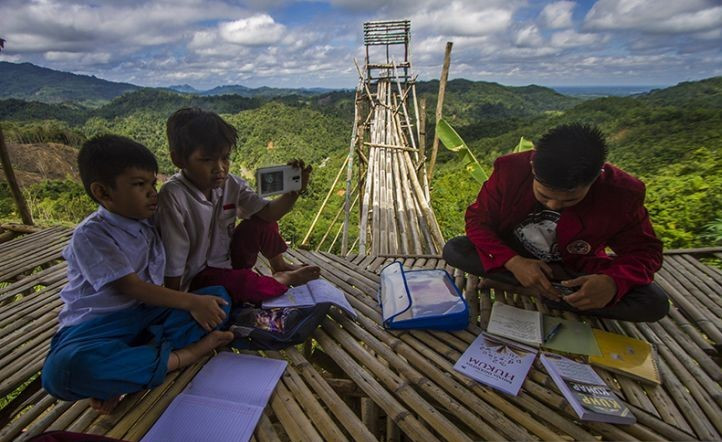Popular Reads
Top Results
Can't find what you're looking for?
View all search resultsPopular Reads
Top Results
Can't find what you're looking for?
View all search resultsMeaningful digital transformation for the Asia-Pacific region
Many Asia-Pacific countries lack overarching e-commerce regulations, leaving significant gaps in areas such as online contracts, e-signatures, consumer protection, cybersecurity, taxation and data privacy.
Change text size
Gift Premium Articles
to Anyone
T
he relentless pace of technological advancement is nothing short of breathtaking. Quantum computers, soon to compute 47 years faster than today’s supercomputers, are nearly a reality.
ChatGPT, once a novelty, has seamlessly integrated into daily life. Drones now traverse the skies, delivering food, medicine and disaster relief to the most remote corners of the globe. Satellites illuminate Himalayan villages with internet connectivity.
Meanwhile, digital technologies have given rise to breakthroughs in biotechnology, robotics, nanotechnology, environmental science and medical research, heralding transformative solutions for humanity and our planet. Indeed, the sky is no longer the limit.
Yet, amid these marvels, a stark reality casts a shadow. The United Nations, striving to achieve the 17 Sustainable Development Goals (SDGs) by 2030, finds itself lamentably behind schedule. Despite our technological strides, progress remains frustratingly sluggish, particularly in the Asia-Pacific, where climate action is alarmingly retrogressing.
Digital technologies offer a lifeline. They hold the promise of being transformative in achieving the SDGs, especially for women entrepreneurs and youth, fostering inclusivity. However, to unlock this immense potential, we must first ensure robust connectivity, cultivate requisite skills, enact appropriate legislation and secure financing.
Connectivity is key and critical to inclusive and sustainable development, especially among least developing countries, landlocked developing countries and small island developing states.
Persistent power shortages and unstable grids, especially in rural areas, hinder necessary infrastructure.
In 2023, 33 percent of the global population remained offline, with 73 percent of these individuals in low-income countries, according to ITU statistics.
The high cost of digital devices further widens this gap. Equally critical is the development of digital skills. Large parts of the population in developing nations, particularly in the least developed countries of the Asia-Pacific, lack the skills to engage with the digital economy. This deficit is exacerbated by poor-quality education, especially in rural areas.
An effective legal and regulatory environment is indispensable. Many Asia-Pacific countries lack overarching e-commerce regulations, leaving significant gaps in areas such as online contracts, e-signatures, consumer protection, cybersecurity, taxation and data privacy.
Only 37 percent of small island developing states and 48 percent of least developed countries have enacted data protection laws. Financing is another critical factor.
Access to capital, especially for women and youth entrepreneurs, is vital for digital sector growth. Around 40 percent of small and medium-sized enterprises (SMEs) in developing countries face a US$5 trillion financing gap, with women-owned businesses receiving just 3 percent of venture capital funding.
The international community's role in galvanizing digital transformation in the Asia-Pacific is pivotal. While initiatives like Aid for Trade have seen an uptick in information and communication technology-related commitments, rising from $1.5 billion in 2019 to $2.2 billion in 2021, these investments account for a mere 4.1 percent of total allocations. There is a pressing demand for substantially increased financial backing.
Effective reform hinges on collaboration among national governments, the private sector and other stakeholders, as well as development partners. Digital technologies are pivotal in addressing SDG challenges in the Asia-Pacific.
In India, drones delivering medical supplies to remote areas drastically improve health outcomes by ensuring timely access to essential medicines and vaccines. In the Philippines, telemedicine bridges healthcare gaps, connecting underserved patients with professionals.
Satellite technology in Indonesia revolutionizes education by bringing internet access to rural communities, enabling virtual classrooms and remote learning, equipping youth with essential skills.
Moreover, digital platforms can spur economic growth by fostering digital entrepreneurship and e-commerce, empowering small businesses, particularly those owned by women and youth, to expand their reach and stimulate economic development. Biotechnology innovations strengthen food security by developing resilient crops, while precision agriculture boosts yield and reduces waste. Environmental monitoring provides critical data, helping governments track deforestation, monitor pollution and predict natural disasters.
Additionally, digital payment systems and mobile banking enhance financial inclusion, offering underserved populations access to essential financial services. This empowers individuals, especially women, to save, invest and build businesses, contributing to poverty reduction and economic stability.
We stand amid a digital revolution, where the urgency for decisive, unified action has never been greater. To tackle the formidable challenges ahead, we must leverage our collective knowledge, skills and expertise.
The international community must rise to the occasion, ensuring that no one is left behind. By prioritizing connectivity, skill development, robust legislation and sustainable financing, we can unlock the transformative potential of digital technologies. Though our future may be precarious, it holds the promise of a more inclusive and sustainable world—if we unite in a global endeavour to embrace this digital metamorphosis.
The time for rhetoric has passed; now, we must escalate our global commitment to ensure the dividends of digital progress are shared by all, leaving no region or community in the shadows. The moment to act is now, to ensure the benefits of this digital era reach everyone, everywhere.
***
Atsuko Okuda is director of International Telecommunication Union (ITU) regional office for Asia and the Pacific. Shamika N. Sirimanne is director for technology and logistics, UN Trade and Development UNCTAD.











